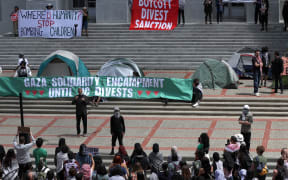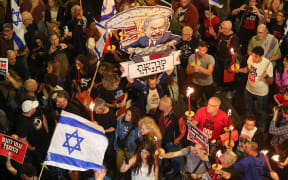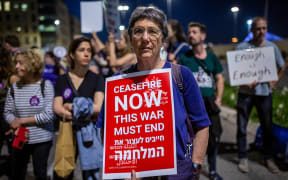By Jonathan Allen and Brendan O'Brien, Reuters
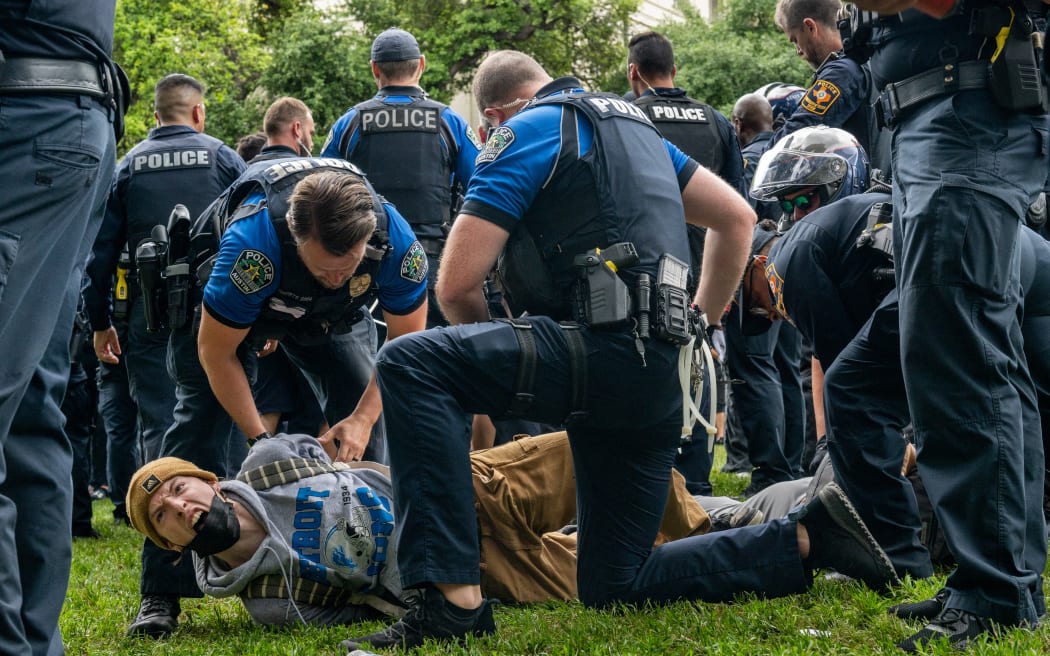
A student is arrested during a pro-Palestine demonstration at the The University of Texas at Austin. Photo: Getty Images via AFP
Tensions appeared to ease at Columbia University after it extended a deadline for students to remove an encampment set up to protest Israel's Gaza incursion, while violence broke out at other college campuses as police dispersed similar protests.
At the University of Southern California in Los Angeles, police scuffled with protesters and took at least one person into custody. Fellow protesters then surrounded a vehicle where the man was being held, chanting "Let him go" and "Shame on you."
In Austin, troopers in riot gear entered on the campus of the University of Texas and forced pro-Palestine protesters and counter-protesters to disperse, according to media reports. At least 10 people were detained, the Texas Tribune reported.
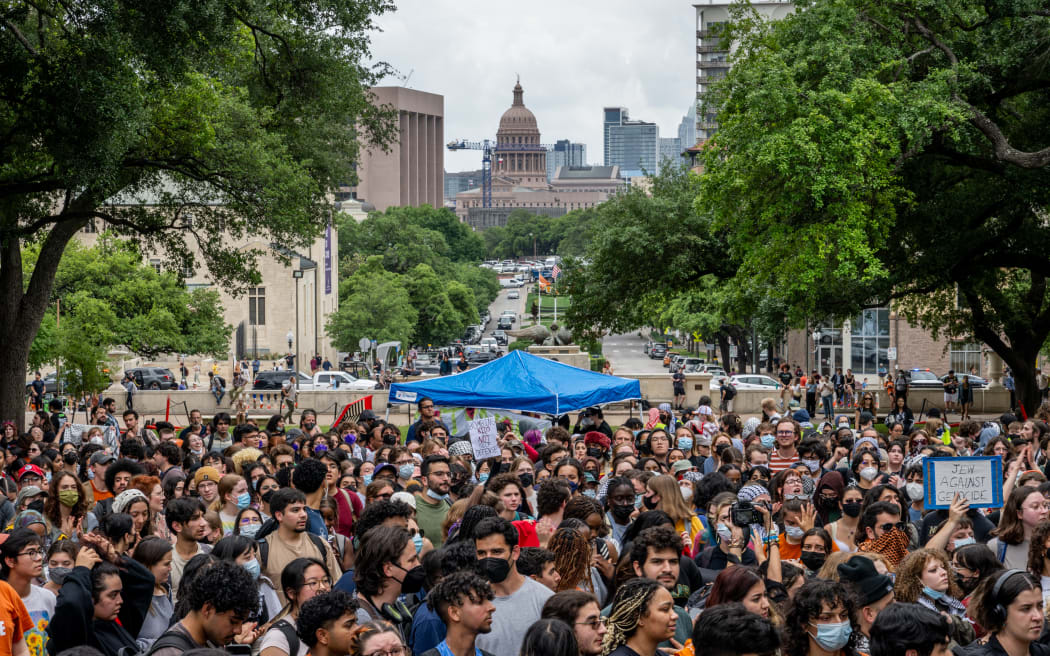
Students rally together during a pro-Palestine protest at the The University of Texas at Austin. Photo: Getty Images via AFP
On Wednesday (local time), tent protests were underway on other campuses from coast to coast, including Brown University in Providence, Rhode Island, the University of Michigan in Ann Arbor, Massachusetts Institute of Technology in Cambridge, and California State Polytechnic in Humboldt.
Meanwhile at Columbia University, administrators said it had extended by 48 hours a deadline of midnight on Tuesday to reach an agreement with student leaders of the protest, pointing to "significant progress" in the talks.
Student representatives of the Columbia University Apartheid Divest (CUAD), a coalition of pro-Palestinian student groups, said on Wednesday morning that Columbia had agreed to extend the talks through to at least 4am on Friday.
As of Wednesday afternoon, the two sides had not met to resume negotiations, said Mahmoud Khalil, a Palestinian student at Columbia who has been part of the negotiations.
Columbia said in its statement that students had agreed to dismantle a "significant number" of the dozens of tents set up on its Manhattan campus.
But the statement by the students said nothing about any agreement to dismantle tents, and it appeared that only a few were taken down as on Wednesday afternoon.
The statement said talks had faltered late on Tuesday night after Columbia threatened an "imminent sweep" by the New York Police Department or the National Guard, but the school had since given a written commitment withdrawing the threat.
Asked about the students' claim, Columbia spokesperson Ben Chang wrote in an email: "There is absolutely no basis to make that claim re: National Guard."
Dozens of CUAD's members have camped out on a lawn at the centre of the Manhattan campus for the past week, calling on the university to end its investments in companies that support or profit from Israel's military actions in the occupied Palestinian territories. Columbia says the encampment violates school rules and was creating strife on campus.
Last Thursday Columbia called in police who arrested more than 100 students at the encampment on trespassing charges, an unusual move that outraged at least some faculty members. The students were suspended and the tents were dismantled, but students have since erected more than 100 tents.
"The encampment raises serious safety concerns, disrupts campus life, and has created a tense and at times hostile environment for many members of our community," Columbia President Minouche Shafik said late on Tuesday, before the agreement to extend the negotiating deadline. "It is essential that we move forward with a plan to dismantle it."
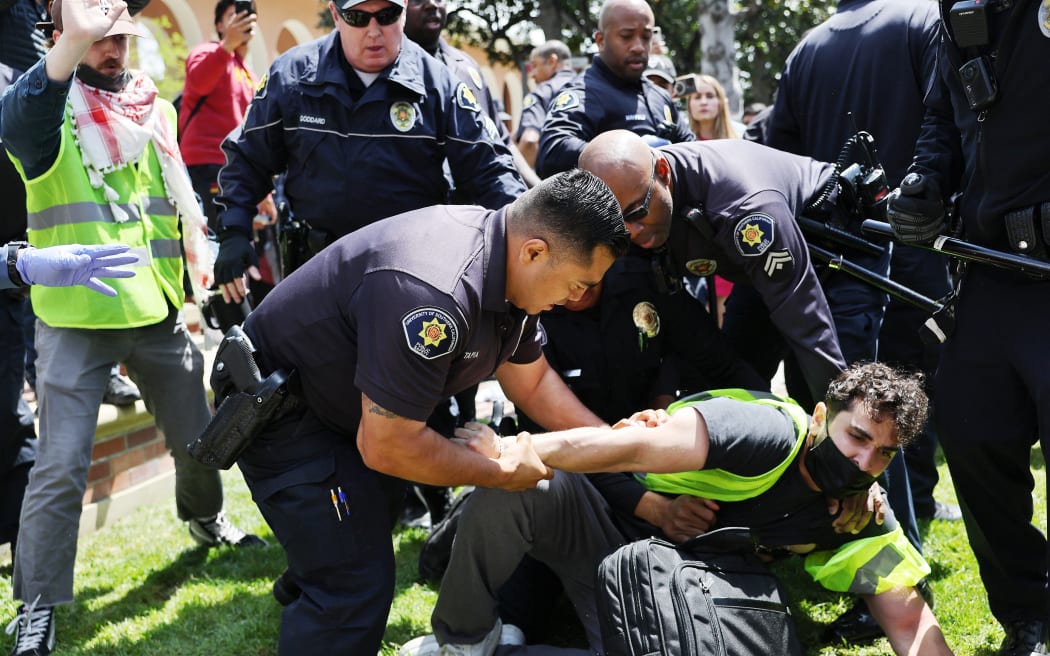
USC public safety officers detain a pro-Palestine demonstrator during clashes after officers attempted to take down an encampment in support of Gaza at the University of Southern California. Photo: Getty Images via AFP
Campus unrest
Columbia is one of many campuses across the United States where debate over Gaza and the US military support of Israel has grown heated.
Since the protest began, some angry verbal confrontations have unfolded between pro-Palestinian and pro-Israel demonstrators, particularly in the busy Manhattan streets surrounding Columbia, and accusations on all sides of language that is antisemitic, Islamophobic or racist.
Students at the encampment say their protest has been peaceful, and that outsiders not connected with their movement are behind any inflammatory confrontations off-campus.
In interviews at several college campuses on Tuesday, Jewish students not involved in campus protests expressed a range of feelings, with some saying they felt in danger and others saying politicians had mischaracterized the protests.
"When you're an Israeli student on this campus, you feel like you have a target on your back, you feel unsafe and it's no wonder students from Israel are so hesitant to come here," said Milton Zerman, a second-year student from Los Angeles attending law school at the University of California, Berkeley.
At Columbia, Zohar Ford and Jacob Gold, two Jewish freshman, watched the bustling entrance of the encampment entrance on Tuesday afternoon, and though they were not involved in the protests they thought they were positive and did not make them feel unsafe.
"What I feel right now is that I think my identity as a Jewish person has been used by a lot of politicians to excuse infringement on free expression," Gold said.
Shafik has been criticized by some prominent university donors and alumni groups, and members of the US Congress, predominantly Republicans. Some have called on her to resign for failing to quell the protests, calling the encampment antisemitic.
US House Speaker Mike Johnson, a Republican, added his name to those demanding Shafik's resignation on Wednesday, and travelled to Manhattan to meet with Jewish students attending Columbia.
- Reuters
